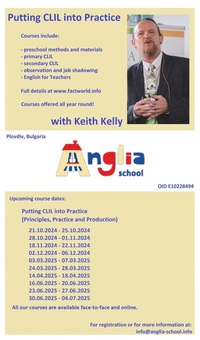NEWS
NEWS
Anglia School opened in September 2012.
At Anglia School not only do we provide a rich learning environment we also immerse your child in the English language. Our curriculum has been developed to include a wide range of skills and competencies to reflect and provide for the individual personalilities and learning styles of each and every child who comes to us.
You can visit Anglia School's bilingual site.
You can join Anglia School facebook page.
You can view Anglia School YouTube channel.
Enjoy!
I gave the opening keynote at the CLILVoc Conference today at the KPH - University College of Education in Linz, Austria.
I promised to make my slides available, so here they are linked.
My talk was a 'state of the art' of CLIL in Austria over the 5-year life span so far of the CLIL in-service training course at the PH Wien.
More news to come!
Language of Chemistry
The Language of Chemistry is an article I wrote for the Chemistry International Journal on the language demands of Chemistry for learners working through the medium of English as a foreign language.
www.iupac.org/publications/ci/2010/3205/1_kelly.html
A CLIL book from OUP.
It feels like it has taken years to get this book together, but actually, it's about two years. OUP have provided us with a publicity flier which I'm posting here so that any interested colleagues can see what to expect.
In terms of content, one of the main things I think we offer in the book is a clear description of a framework for describing and implementing CLIL practice. The framework offers three dimensions of CLIL: language, concepts, procedures. We frequently make use of the term '3D CLIL' for this reason. You might say that these dimensions appear in all classes, no matter what language of country we're examining. But, the point about CLIL is that the foreign language is crucial to all planning and practice and it is the concepts and the procedures that dictate what this language will be. Hence, the CLIL teacher will know what concepts they are teaching and what procedures to use in their class (and this applies to the mother tongue content classroom) but it is the foreign language dimension that most obviously sets CLIL practice apart from any mother tongue context. Planning in any context for teaching any subject through the medium of any foreign language, then, will identify concepts and procedures first and then consider any foreign language demands and needs and make allowances.
'Making allowances' is what this book is all about.
What does a teacher need to think about when learners are reading/listening/writing/speaking about their subject in a foreign language? You'll find suggestions and much more in 'Putting CLIL into Practice'.
Personally, I'd like to thank Phil for giving us the push we needed to get it all down on paper. Thanks Phil. I'd like to thank John for keeping things logical and meaningful. Me, I just bring some teaching ideas and many of you who know me professionally who buy and read this book will no doubt recognize where I've contributed.
Incidentally, Phil has a video in YouTube where he talks about designing materials for CLIL. It's a useful clip as Phil talks through the three dimensions so you get an understanding of 3D CLIL, which is a flag we fly wherever we go.
Phil previously referred to the three dimensions as 'the holy trinity of CLIL', but that since evolved into the safer 3 dimensions!
This site and factworld@yahoogroups.com are good places to participate in any discussion which comes about from the appearance of the book in your local bookshops!
The OUP flyer is linked below.
- - -
CLIL, English teachers and the three dimensions of content
![/userfiles/files/3DCLIL.jpg [/userfiles/files/3DCLIL.jpg]](/userfiles/files/3DCLIL.jpg)
This is a very readable article from Phil Ball on the English teacher perspective of 3D CLIL.
The people at Modern English Teacher very kindly gave us permission to reproduce the article in full and you can download from here.
There is a review of the book in Estudios sobre Educación from the University of Navarra from Ruth Breeze:
https://www.unav.edu/publicaciones/revistas/index.php/estudios-sobre-educacion/article/view/7761/6782
At last the 3Ds of CLIL get some independent recognition (pdf below).
Basque Trilingualism
This is an article based on an interview I did on trilingualism in the Basque Country, Spain.
Discussion revolved around the dimension of language when learning the curriculum through another language. This is also an article I'd written for Macmillan's onestopenglish.com site.
The Basque version and Castellano version of this article are attached below.



![/userfiles/files/PCIP%20advert%202024-2025%281%29.jpg [/userfiles/files/PCIP%20advert%202024-2025%281%29.jpg]](/userfiles/files/PCIP%20advert%202024-2025%281%29.jpg)


